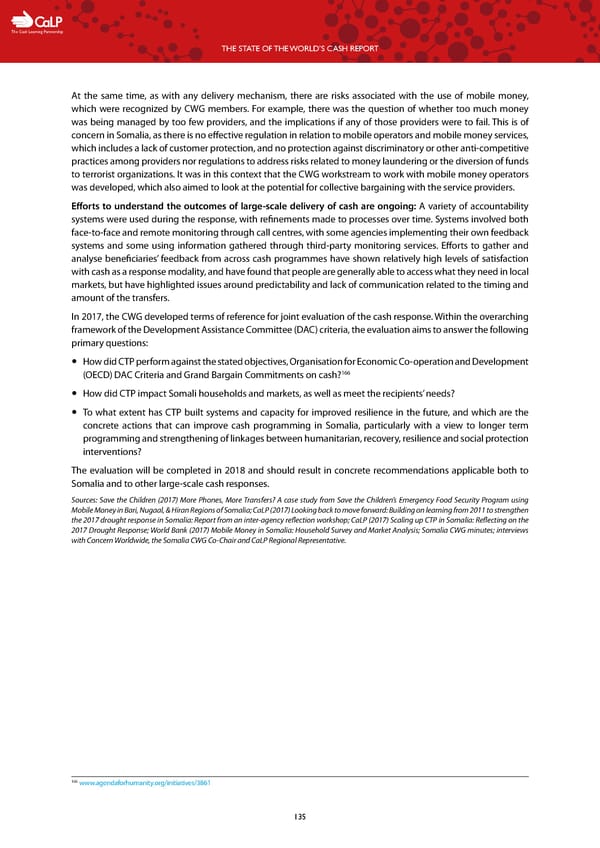C The Cash Learning Partnership THE STATE OF THE WORLD’S CASH REPORT At the same time, as with any delivery mechanism, there are risks associated with the use of mobile money, which were recognized by CWG members. For example, there was the question of whether too much money was being managed by too few providers, and the implications if any of those providers were to fail. This is of concern in Somalia, as there is no effective regulation in relation to mobile operators and mobile money services, which includes a lack of customer protection, and no protection against discriminatory or other anti-competitive practices among providers nor regulations to address risks related to money laundering or the diversion of funds to terrorist organizations. It was in this context that the CWG workstream to work with mobile money operators was developed, which also aimed to look at the potential for collective bargaining with the service providers. Efforts to understand the outcomes of large-scale delivery of cash are ongoing: A variety of accountability systems were used during the response, with refinements made to processes over time. Systems involved both face-to-face and remote monitoring through call centres, with some agencies implementing their own feedback systems and some using information gathered through third-party monitoring services. Efforts to gather and analyse beneficiaries’ feedback from across cash programmes have shown relatively high levels of satisfaction with cash as a response modality, and have found that people are generally able to access what they need in local markets, but have highlighted issues around predictability and lack of communication related to the timing and amount of the transfers. In 2017, the CWG developed terms of reference for joint evaluation of the cash response. Within the overarching framework of the Development Assistance Committee (DAC) criteria, the evaluation aims to answer the following primary questions: — How did CTP perform against the stated objectives, Organisation for Economic Co-operation and Development 166 (OECD) DAC Criteria and Grand Bargain Commitments on cash? — How did CTP impact Somali households and markets, as well as meet the recipients’ needs? — To what extent has CTP built systems and capacity for improved resilience in the future, and which are the concrete actions that can improve cash programming in Somalia, particularly with a view to longer term programming and strengthening of linkages between humanitarian, recovery, resilience and social protection interventions? The evaluation will be completed in 2018 and should result in concrete recommendations applicable both to Somalia and to other large-scale cash responses. Sources: Save the Children (2017) More Phones, More Transfers? A case study from Save the Children’s Emergency Food Security Program using Mobile Money in Bari, Nugaal, & Hiran Regions of Somalia; CaLP (2017) Looking back to move forward: Building on learning from 2011 to strengthen the 2017 drought response in Somalia: Report from an inter-agency reflection workshop; CaLP (2017) Scaling up CTP in Somalia: Reflecting on the 2017 Drought Response; World Bank (2017) Mobile Money in Somalia: Household Survey and Market Analysis; Somalia CWG minutes; interviews with Concern Worldwide, the Somalia CWG Co-Chair and CaLP Regional Representative. 166 www.agendaforhumanity.org/initiatives/3861 135
 The State of the World's Cash | Full Report Page 136 Page 138
The State of the World's Cash | Full Report Page 136 Page 138